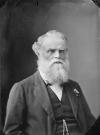Josiah Firth
Josiah Clifton Firth
Born in west Yorkshire, England on 27th October, 1826 and died when he was 71 on 11th December 1897.
His parents were Mary Bateman and Reverend Benjamin Firth, who was the headmaster of the Manor House Academy and also minister of Wyke Church. Both of his parents came from families with wealth. His mother however, died when Josiah Firth was only seven years of age and he was raised from this point on by his father and a female employee.
Josiah was educated by his father who provided a practical, trade based education. The 1847 crash however ruined his father, Benjamin, and he spent the following three years farming in Yorkshire. Between 1850 and 1854 he was employed as manager of his maternal uncle’s ironworks. He then migrated to Melbourne, Australia on the ship, Golden Era.
A short time after arriving in Australia, Josiah Clifton Firth traveled to New Zealand where he settled in Auckland. In Auckland he was a member of small group of businessmen including John Logan Campbell, and Frederick Whitaker. He built and developed a number of very large and successful flour mills before becoming part of a direct purchase association intent on purchasing Māori lands throughout the Auckland, and eventually wider, area.
Josiah Firth married Anne Williams (daughter of William Williams and Nancy Stockett) on the 26th December, 1856. They had 12 children.
Josiah Firth was an early European to arrive in Matamata; traveling by boat down the Waihou in 1859. In 1865 he began leasing in Matamata which he eventually took ownership of by questionable means. A year later, with the death of the Māori leader Tamihana, Josiah Firth took ownership of more than 55,000 acres of Matamata flats for just £12,000. He worked hard to convert this into profitable farmland and other agricultural developments. The Firth Tower, which is still standing today, was named after him because when the Māori attacked he and his workers climbed up the Firth Tower and shot the oncoming Māori with their guns.
Josiah Firth's good fortune eventually turned as business ventures became unprofitable and in 1887 Josiah Firth left Matamata for good. His land and businesses made their way into the hands of what was later to become the Bank of New Zealand and by 1889 Josiah Firth had slipped into bankruptcy.
photo credit;
Portrait of Josiah Clifton Firth. Ref: 1/2-004946. Alexander Turnbull Library, Wellington, New Zealand.http://natlib.govt.nz/records/22549884

